By Dr. Graeme P. Herd, Marshall Center professor
Introduction: Ending the Cold War
Mikhail Sergeyevich Gorbachev, the last general secretary of the Communist Party of the Soviet Union (CPSU) and the Union of Soviet Socialist Republics’ (USSR’s) first and last president, died on August 30, 2022. He has become our contemporary Rorschach test: appreciations and assessments reveal biases, subjectivity and underlying agendas. Immediate appraisals of Gorbachev’s life encapsulate a wide, almost schizophrenic spectrum of opinion: Gorbachev was labeled, variously, a hero, saint, tragic figure, traitor and fool. Adam Michnik, editor of the Polish daily newspaper Gazeta Wyborcza, noted that whatever Gorbachev’s intentions, his actions changed the course of history. Pope John Paul II stated that Gorbachev, the 1990 Nobel Peace Prize winner, “was sent by God,” though for many in Russia, his choices were treasonous.
Assessments of Gorbachev’s foreign policy legacy differ markedly outside and inside the borders of the former Soviet Union. Outside, Gorbachevian reforms are viewed as necessary, and criticism is focused on their ineffectiveness. For the nearest neighbors, all but Belarus celebrate Gorbachev’s unintended role in their restorations of independence. More generally, assessments focus on the gap between Gorbachev’s intent and the actual outcome, the extent to which Russian President Vladimir Putin dismantles Gorbachev’s legacy, and the role of the individual in history.
Gorbachev died six months and six days after Russia had launched a full-scale, multi-axis attack on Ukraine on February 24, 2022. The invasion transformed contemporary strategic competition into conflict and crisis, triggering unprecedented Western cooperation to support Ukraine’s right to self-defense and statehood. What do appreciations of Gorbachev’s legacy tell us about the nature of current strategic competition and what do they signal about the direction of Russia’s politico-strategic journey over the past 30 years? While Gorbachev experienced the USSR’s strategic collapse, does late-Putinism face similar factional infighting with the potential for triggering regime change, or even the disintegration of the Russian Federation?
Funeral Respects
Putin offered a short official statement by way of response to Gorbachev’s death: “Mikhail Gorbachev was a politician and statesman who had a huge impact on the course of world history. He led our country during a period of complex, dramatic changes, major foreign policy, economic and social challenges. He deeply understood that reforms were necessary and strove to offer his own solutions to urgent problems.” Gorbachev was afforded respectful but limited coverage on Russian television. The state did not provide a full state funeral — Putin was said to be too busy to attend — though it contained some elements, such as honor guards under the Russian flag in the historic Hall of Columns, and was organized by the presidential protocol service. Kremlin spokesperson Dmitry Peskov credited Gorbachev with “sincerely wanting to believe that the Cold War would end and an eternal romantic period between a new Soviet Union and the world, the collective West, as we call it, would commence.” However, Peskov went on to claim, it was then that the “bloodthirstiness of our opponents manifested itself. It is good that we [Russia under Putin] realized and understood that in good time.”
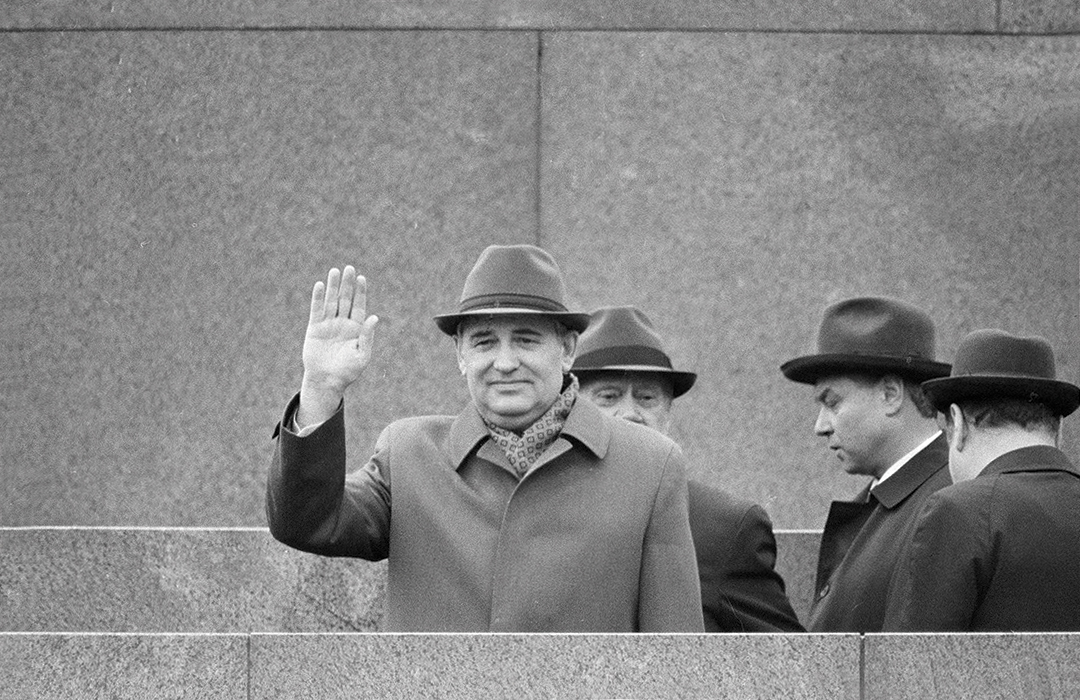
Other Russian commentators were not so circumspect. Leonid Slutsky, a senior member of the state Duma and head of a so-called systemic opposition party, the Liberal Democratic Party of Russia, stated: “I feel sorry for the great country, whose disintegration began in the era of ‘perestroika’ and ‘new thinking’ and played into the hands of those who sought to erase the USSR from the political map of the world.” Gennady Zyuganov, leader of the Communist Party of the Russian Federation, went further, amalgamating Gorbachev with former Russian President Boris Yeltsin, and attacking both: “If I were Putin, I would have shut down the Yeltsin Center and the Gorbachev Foundation a long time ago. I would have used it as a center for patriotic training to bring up worthy people. All those problems have already become overripe.”
Russian journalist Vladimir Vorsobin proved vitriolic in his condemnation of Gorbachev: “And when the Empire started to concentrate again, when the Empire started to absorb its lost territories, exactly in this year (2022) … the ‘grave-diggers of the USSR’ started to go away. Ex-President of Ukraine [Leonid] Kravchuk, ex-head of Belarus [Stanislau] Shushkevich, ex-State Secretary of the Russian Federation [Gennady] Burbulis. And like a captain, the last to leave his ship, Gorbachev went away. … They will try to bury his ‘temple of the sun’ — of Perestroika, Glasnost, Democracy, openness to the world — in oblivion as soon as possible. From all sides.”
By contrast, music journalist and Kremlin critic Artemy Troitsky noted that Gorbachev was “by and large the only normal ruler” Russia had had since the tsar Alexander II. Gorbachev was “not a sadist, not a thief, not an idiot, not a power seeker.” Grigory Yavlinsky, a Russian liberal politician and economist who drafted Gorbachev’s 500-day economic plan, stated: “Mikhail Gorbachev freed us — his contemporaries. … He liberated us. And he did this of his own volition. We didn’t even ask him. At the time, only a miniscule number of people were fighting for freedom, while even fewer believed that this was actually possible. Gorbachev gave us all freedom. He is not to blame for what we did with this freedom.”
In many former Soviet republics (the “inner empire”), Gorbachev is praised, albeit faintly, because his attempts to reform a stagnating system unleashed unintended but welcome consequences: the accelerated collapse of the USSR and communism, subsequent independence and the initiation of democratic change in Russia itself. As such, he is a symbol of freedom, empire and destruction. As Latvian Foreign Minister Edgars Rinkēvičs tweeted: the “collapse of the USSR was the best moment of the 20th century. The end of the Cold War was great but the killing of people in Tbilisi, Vilnius, Riga is also part of his [Gorbachev’s] legacy. It is up to the History to judge him.” Lithuania’s Foreign Minister Gabrielius Landsbergis condemned Gorbachev’s use of state violence to suppress dissent in Vilnius on January 13, 1991, when 14 civilians were killed and 140 injured as Soviet troops stormed the TV Tower and the Radio and Television Committee building in Vilnius: “Lithuanians will not glorify Gorbachev. We will never forget the simple fact that his army murdered civilians to prolong his regime’s occupation of our country. His soldiers fired on our unarmed protestors and crushed them under his tanks. That is how we will remember him.”
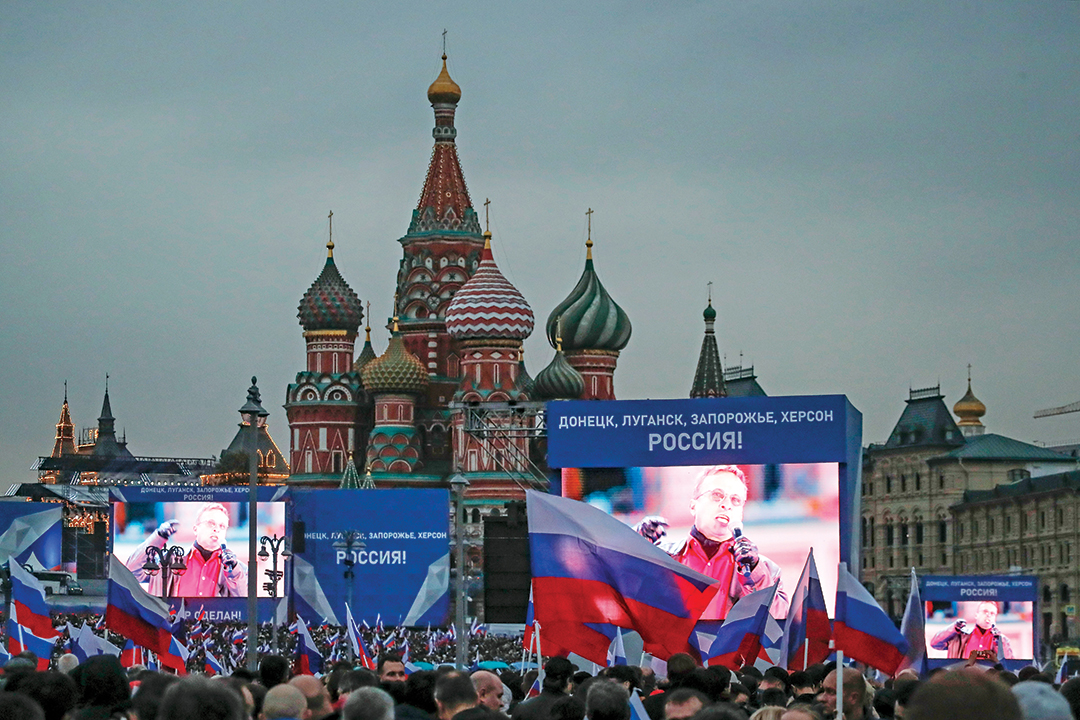
Sultan Akimbekov, director of the Institute of Asian Studies, noted that no one is indifferent to Gorbachev’s passing, and that emotions are mixed in Kazakhstan. Gorbachev is hated for the “collapse of the huge country, for the loss of its social policies and for depriving them of clarity in terms of the future of their private lives, for which during the times of the USSR the state bore full responsibility. Others thanked him for the opportunities that were given — for glasnost, political and economic liberalism, and for making the national republics free.” In Belarus, Vital Tsyhankow, columnist for the pro-opposition website Salidarnasts, observed: “People wonder sometimes why Gorbachev is so loved in the West and so hated in Russia. It is simple. Gorbachev stood for freedom of choice, universal values and pluralism. All the things that are so valued in the West and so hated in Russia.”
In Central and Eastern Europe (the Soviet “outer empire”), Gorbachev’s policies of glasnost and perestroika take a back seat to his refusal to apply military force to prevent the collapse of the Iron Curtain and communism in 1989. In 1989, Gorbachev adopted a “Sinatra/My Way” doctrine (satellites were free to develop their own foreign and security policies), a clear reversal of Soviet leader Leonid Brezhnev’s doctrine of limited sovereignty, a doctrine Putin rhetorically revived in his Munich Security Conference speech of 2007. There were no repeats of the Warsaw Pact invasions of Hungary in 1956 and Czechoslovakia in 1968 on Gorbachev’s watch; Putin invaded Georgia in 2008, and Ukraine in 2014 and again in 2022. Gorbachev did not use mass-scale state violence to achieve Soviet objectives; Putin targets Ukrainian civilian centers and its energy grid with Iranian-made swarm drones and Russian missiles. Gorbachev offered greater political freedom, while Putin ruthlessly represses.
Gorbachev is also understood to have been an enlightened communist, the anti-Putin. As one commentator put it: “Be grateful to Gorbachev. What if the USSR was ruled in the 1980s by someone like Putin?” Romanian journalist Cristian Tudor Popescu underscores this sentiment: “In the gallery of monsters who ruled the USSR from 1917 until today, Mikhail Sergeevich Gorbachev was the only human being. The only one who tried to stop the Great Killing Machine. I never could understand, no matter how much political analysis I read, how it was possible for Gorbachev to take the place of Stalin and Putin. It was almost like a fairy tale.” Putin dismantles Gorbachev’s legacy and ruins his life’s work, according to Bulgarian professor Rumen Kynchev: “The policies conducted by Putin now differ from Gorbachev’s, who wanted to transform Russia into a modern state, embracing the Western model of democracy. Putin’s stance is radically different. What he has been doing for the last 10 years is returning Russia to its imperial past.”
Chinese responses to Gorbachev’s passing were mixed. Gorbachev is held responsible for the collapse of the USSR, but also for normalizing Sino-Soviet relations, reducing the Soviet threat to China and enabling three decades of globalization, and with it, China’s economic rise. The nationalist state-run Chinese tabloid Global Times argued that Gorbachev “blindly worshipping the Western system made the USSR lose independence and the Russian people suffer from political instability and severe economic pressure.” The “moral” or “lessons” of Gorbachev’s regime propagated by the Chinese media are clear: overly radical, excessive reform leads to decentralization, democratization, and then instability and disintegration. China’s state-run news magazine Global People referenced an interview with Gorbachev in 2006, quoting him as warning: “Chinese friends: Don’t do anything about democratization, that won’t bring good results! Don’t allow chaos; stability comes first.” The collapse of the USSR is presented as a cautionary tale for China — economic progress must be prioritized over political reform — a “Reverse Gorbachev” belief Chinese President Xi Jinping has taken to heart.
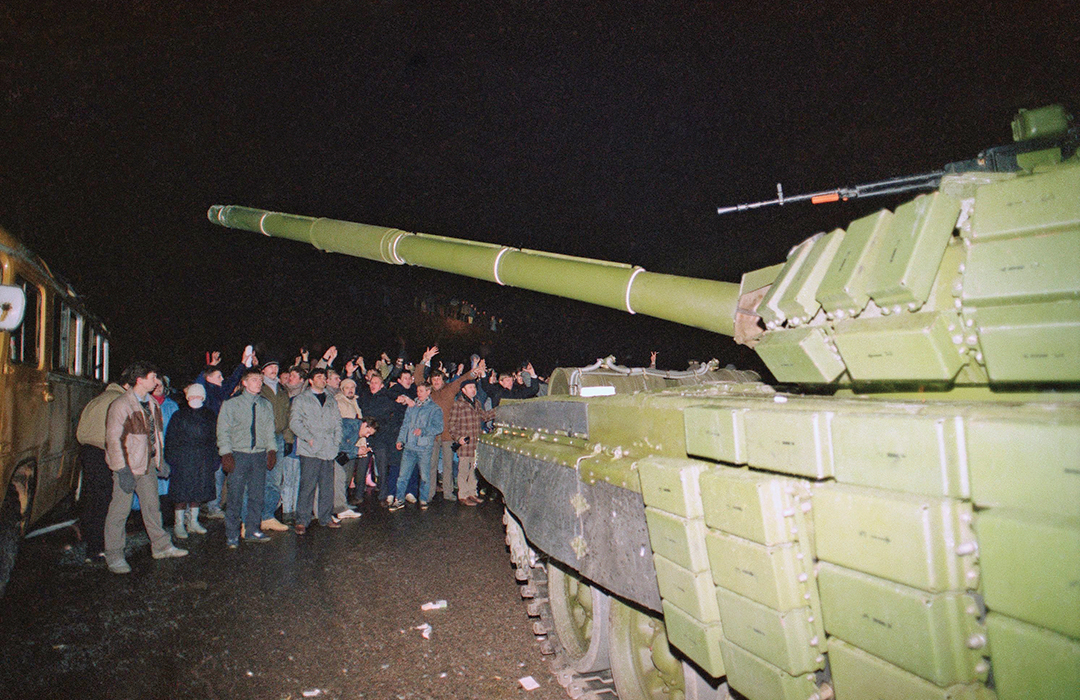
Western media reporting on Gorbachev’s death almost unanimously praised the catalytic role and legacy of the last Soviet leader. French President Emmanuel Macron noted that Gorbachev was: “a man of peace whose choices opened up a path of liberty for Russians.” European Commission President Ursula von der Leyen praised him as a “trusted and respected leader” who “opened the way for a free Europe.” Indian Prime Minister Narendra Modi tweeted that Gorbachev was “one of the leading statesmen of the 20th [century] who left an indelible mark on the course of history,” and that, “We recall and value his contribution to strengthening of relations with India.” In Nigeria, editorials lamented the lack of a courageous leader to make hard choices and initiate a reform effort to address decay and stagnation while avoiding state collapse.
Left of center, the independent Israeli broadsheet Haaretz acknowledged Gorbachev’s role in shaping modern Israel by allowing the exodus of 3 million Soviet Jews, 1 million of whom boosted Israel’s “hi-tech industry, the health system, music and sport.” In 2022, 100,000 Russian information technology specialists similarly emigrated, this time to Georgia, Armenia, Kazakhstan and beyond. Ariel Bulshtein, writing in the right-leaning Yisrael Hayom, and echoing the “exodus” theme, noted that Gorbachev’s personality — the “last Pharaoh of the USSR” — was critical: “Unlike the original Pharaoh of Egypt, Gorbachev took the decision to free the Jews and let them leave. Unlike Egypt’s original Pharaoh, he did not regret [the decision], and did not pursue those leaving and did not try to destroy them. … Some redeem their world with one decision.” Pinchas Goldschmidt, who resigned his post as chief rabbi of Moscow in July 2022, advised Jews to leave Russia to avoid being made a scapegoat for hardships caused by Putin’s war of choice in Ukraine: “We saw this in tsarist times and at the end of the Stalinist regime.”
Gorbachev’s Legacy: Putin’s Inheritance
Gorbachev’s reforms were opposed by party and state officials whose survival depended on the status quo. Gorbachev sought to revive Marxism, free the USSR and rehabilitate Soviet society. Gorbachev faced an existential dilemma: how to be both Martin Luther and the pope? How to both preserve the Soviet system and reform it? Gorbachev’s unscripted “solution” was to weaken the CPSU by dismantling the political and constitutional structure that upheld the monopoly of power enjoyed by the party and mobilize society without recourse to large-scale coercion and bloodshed.
But this resulted in the erosion of his own power: perestroika could not deliver quickly enough the promises of glasnost. Glasnost allowed society to complain vigorously, publicly and continuously about the gap between promise and performance, and it undercut Soviet citizens’ belief in the cornerstones of the Soviet system, namely fear of coercion, CPSU omnipotence and censorship. As a sincere Marxist-Leninist who believed in the dialectic, Gorbachev was unable to generate a sustainable synthesis. Gorbachev failed to save the USSR by reforming it.
Assessments also raise counterfactual and “what if?” questions. Might the outcome have been even more bloody without Gorbachev as decision-maker? Alternatively, might Gorbachev have chosen other paths? What of the Chinese economic liberalization and political control model? What was to stop Gorbachev extending the life of the Soviet Union another decade or two, enjoying power as a “Brezhnev-2” or, more contemporaneously, as a Soviet Deng Xiaoping? Could there have been economic acceleration without restructuring?
In answer, we can only surmise that there could have been, but not with Gorbachev; the human factor (personality) matters in history. Jonathan Steele, an old hand in the 1980s Moscow journalistic fraternity, notes that Gorbachev “was the most democratic leader that Russia (the USSR’s de facto center) had over the last century, if not ever.” Russian-American professor Nina L. Khrushcheva concludes that: “What made Gorbachev different from other Russian leaders was that he accepted responsibility for the consequences of his rule” and that, “He was the first leader since Vladimir Lenin to graduate from a university. He was intelligentny.” Gorbachev remained grounded.
For dictatorial Belarus, China and contemporary Russia, however, the clear “Gorbachev lesson” is that pro-Western policies, democratization, reform and restructuring lead to chaos, corruption, dislocation and disintegration. As “slippery slopes” unleash “Frankenstein’s monster,” the phrase “never loosen the screws unless you want collapse” becomes Gorbachev’s fabricated legacy. This “strategic insight” becomes the foundational myth of the Putin era: from disorder under Gorbachev and then Yeltsin comes order under Putin. In this reading of reality, Gorbachev is Adam, the Soviet Union is the Garden of Eden, and the original sin is in the eating of the forbidden fruit of reform. Gorbachev is scapegoated for the mistakes, failures and shortcomings of the Gorbachev-Yeltsin era, from the collapse of the empire to economic dislocation. Gorbachev became the corrupted avatar into which the current elite and its state bureaucracy could pour its collective sense of humiliation, shame and anti-Western grievance for its bloodless defeat (“the greatest geopolitical tragedy of the 20th century,” in Putin’s words). His death provides catharsis and atonement of sorts, but only of sorts, for only through aggression in Ukraine can Putin enact a revenge for the past, for 1989 and 1991.
Contemporary Russian propaganda hammers home a constant message: as transformation cannot occur without upheaval, a stable status quo every time beats disruptive reform. In reality, though, such an understanding fails to acknowledge the legacy that Gorbachev himself inherited in 1985: a discredited leadership, a corrupt state-directed economy, a war in Afghanistan going nowhere, and unrest in Poland. Gorbachev’s role as the George Washington of post-Soviet Russia, enabling a peaceful transfer of power, is discounted. Such propaganda fails to question whether Putin’s blend of Russian national imperialism, partial mobilization and Soviet-style propaganda will sustain his regime, though it does, implicitly, invite comparisons between the legacy Gorbachev inherited and the legacy that Putin will leave his own successor.
In the 1996 presidential election, Gorbachev received 0.5% of the popular vote, and his Social Democratic Party never achieved more than 1.5% of the popular vote. Gorbachev emerged as a critic of Putin, and he was particularly vocal about the rigged Duma elections in 2011. On his 80th birthday celebration that year, Gorbachev stated that Putin had built a sham democracy: “We have everything — a parliament, courts, a president, prime minister and so on. But it’s more of an imitation.” By 2013, Gorbachev claimed Putin’s inner circle was full of “thieves and corrupt officials.”
However, as Putin’s manufactured popularity grew, Gorbachev’s fell. A 2021 poll reported that 70% of respondents believed Russia deteriorated with him at the helm. In a film produced that year for his 90th birthday (“President of the USSR: First and Last”), Gorbachev lamented that his phone calls to the Kremlin were not returned. Gorbachev never publicly condemned the annexation of Crimea or the invasion of Ukraine, but on February 26, 2022, the Gorbachev Foundation stated: “We affirm the need for an early cessation of hostilities and immediate start of peace negotiations. There is nothing more precious in the world than human lives.”
As the war in Ukraine progressed through 2022, Germany’s Russland-Politik has been among its first conceptual casualties. Other echoes of the late Soviet period abound. The December 2022 Viktor Bout-Brittney Griner prisoner exchange between Russia and the United States reminds us of Cold War spy exchanges between the Soviet Union and the U.S., with Abu Dhabi as the stand-in for the Glienicke Bridge connecting Berlin with Potsdam. The appointment of Gen. Sergei Surovikin as commander of Moscow’s combat operations in Ukraine, a role in which he served from October 2022 to January 2023, drew attention to his role as a captain in August 1991, when as a commander of a battalion of BMP infantry fighting vehicles, he attempted to break through a barricade set up by anti-coup protestors and pro-Yeltsin supporters in Moscow, killing three demonstrators. Surovikin was imprisoned but the charges were dropped. Indeed, on August 20, 1991, Putin, then a lieutenant colonel, claimed to have resigned from the KGB.
References in 2022 to Russian vertical nuclear escalation and changes to military nuclear doctrine to allow a first strike against a non-nuclear state contrast starkly to the late 1980s and the raft of arms control agreements — most notably the December 8, 1987, Intermediate-Range Nuclear Forces Treaty — negotiated between Gorbachev and U.S. President Ronald Reagan.
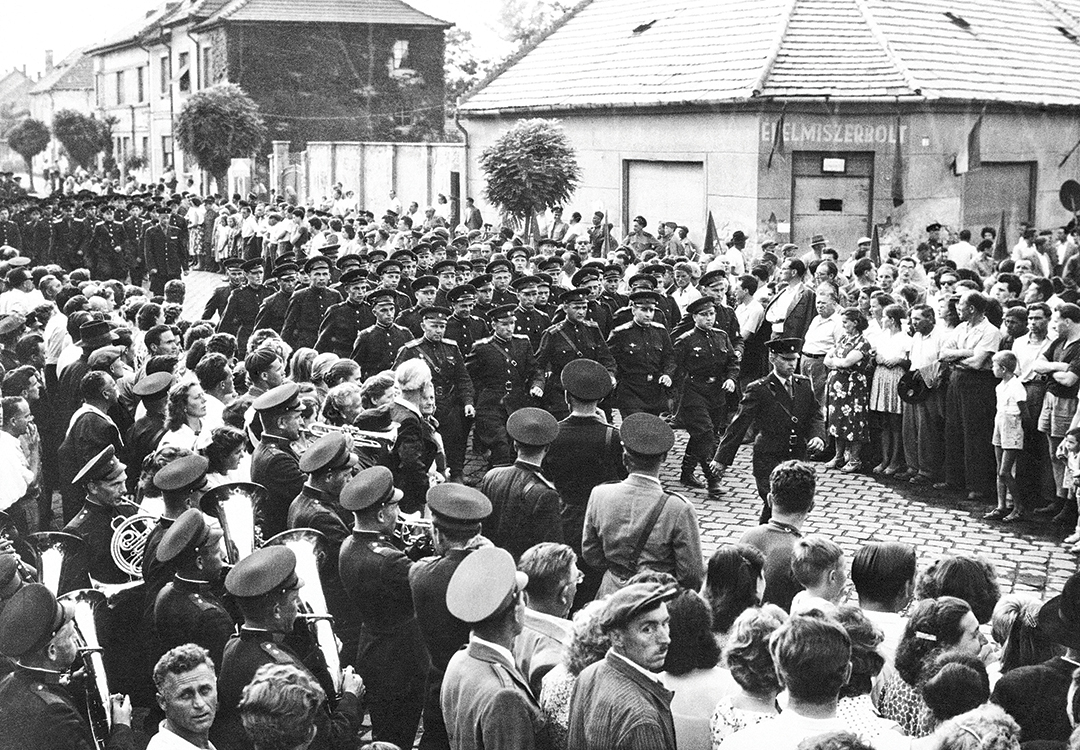
Gorbachev is castigated by Putin for the collapse of the Soviet Union. In his speech declaring the initiation of the “special military operation” on February 24, 2022, Putin labeled Gorbachev the most effective destroyer of the Soviet system. By contrast, and without shame, Putin projects himself as the restorer of “historical Russian lands” and “Slavic unity” and as the “liberator of Ukraine.” On December 30, 2022, Russian state television broadcast a documentary devoted to the centenary of the USSR that presented the Soviet Union as a strong and successful state (“an empire of kindness”) and Gorbachev as “the gravedigger of the Communist Party and the USSR,” whose “naive” foreign policy helped the U.S. implement its 1982 plan to destroy the USSR.
The deterioration of the Putin-Gorbachev relationship over the past two decades reflected their different philosophical beliefs: Putin’s mobilization, invasion, annexation and martial law contrast starkly with Gorbachev’s negotiated reductions, diplomatic compromises, internationalism and commitment to peace. Gorbachev traded military surplus for political gains. Gorbachev’s promise of liberation, hope and the anticipation of a bright future was a step forward. Putin’s forever war and characterization of Russia as a besieged fortress supposedly rising from its knees, whose only future is in its history, is a step back.
From Collapse of the USSR to Culmination in Russia?
Does Putin’s aggression in Ukraine create the prospect of Russia’s culmination or exhaustion and eventual defeat? In December 2022, Oleksiy Danilov, secretary of Ukraine’s National Security and Defense Council, predicted regime collapse in Russia, pointing to the seeming stability on May 1, 1991, in Red Square. He noted that the usual events were taking place: “the parade, the banners, the leaders standing on the Mausoleum, and so on. Nonetheless, four months later, that which was called the USSR and was believed to live forever, ceased to exist. … It only took Gorbachev to go to the Ukrainian Crimea, to immediately set everything off and then finish it, too. Therefore, let us wait for certain events that are bound to happen there. They will certainly happen.”
Almost from the very beginning of the invasion, observers have predicted a split between Russian elites, who support a more aggressive military engagement, and proponents of a more peaceful resolution of the conflict — between conservative militaristic hardliners (“party of war” or hawks) and reformist technocratic “soft-liners” (“economic-technocratic bloc” or doves). Such splits would help put an end to the hostilities. What the military theorist Carl von Clausewitz describes as a culmination or exhaustion point would be reached and result in revolt or revolution by society from below, a palace coup within the elite, and/or military mutiny.
But culmination has not occurred, despite Russia’s need to mobilize and Ukrainian military advances in the Kharkiv and Kherson regions. Rather, an intra-elite consensus and even consolidation and convergence demonstrate that there is no fundamental internal disagreement over Russia’s strategic ends. Furthermore, there is no reason to expect a split among the Russian elites in the foreseeable future. Indeed, Russian political scientist Vladimir Gelman argues that in authoritarian regimes “a split within elites into two or more relatively stable competing factions is possible only when these regimes are governed through collective leadership.” This was certainly the Soviet experience. Splits occurred when collective leadership was exercised after Stalin’s death, when the Presidium/Politburo of the Central Committee was the main decision-making body, and in 1957, 1964 and between 1987-1990 when Gorbachev battled critics who opposed liberalization within the Politburo and the Central Committee.
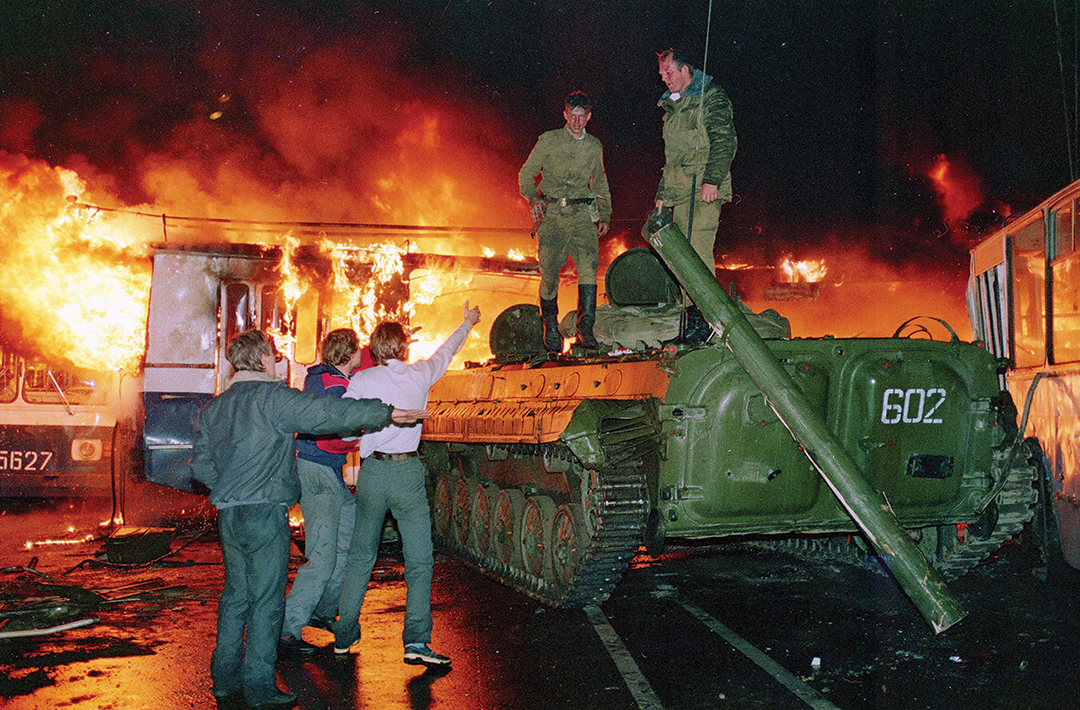
Collective decision-making is not in evidence in Putin’s Russia. The Security Council is at best a sounding board and mechanism to secure complicity, as the February 21, 2022, emergency session amply illustrated. Putin rules through an elite network whose representatives he personally co-opts. Structural factors also impede the military’s ability to launch an effective challenge to the Kremlin — such as a Russian equivalent of the German Operation Valkyrie in July 1944. There is no such tradition of military revolt. Russia’s armed forces remained nonaligned in the August coup of 1991 and the October events of 1993, when President Yeltsin confronted the Supreme Soviet. The FSB’s military counterintelligence department, the largest in the FSB, has wide latitude to monitor dissent within the military. The FSB itself, under Aleksandr Bortnikov since 2007, exudes a pervasive culture of mistrust. It is structured so that individuals are loyal to their rank not to their subordinates or managers. The elevated status of those in their 30s and 40s who have only known Putin as the nation’s leader makes them more, not less, loyal to the regime.
However, if in the early 2020s there are no evident polarizing splits between Putin supporters and opponents, as was the case with Gorbachev in the late 1980s, elite infighting over the reallocation of resources and appointments to influential positions are currently very much in evidence. Institutional actors and subinstitutional factions do not aim to remove Putin but rather to secure their competitive goals at the expense of their domestic rivals. Shifting opportunistic alliances are driven by perceptions of weaknesses and ruthless self-interest. Russian military failure fuels a power struggle over the position of Russian Defense Minister Sergei Shoigu. Igor Strelkov, a spokesman for the FSB leadership and nationalist army officers, Igor Zolotov, head of Russia’s National Guard, and Yvgeny Prigozhin, deceased head of the private military company the Wagner Group, have been chess pieces on this “competitive goals” board. Prigozhin had openly criticized St. Petersburg Gov. Alexander Beglov, Shoigu and Chief of the General Staff Valery Gerasimov before leading Wagner Group forces in a short-lived mutiny in June 2023 aimed at forcing concessions from — or even the dismissal of — the military’s high command. On August 23, the Pentagon said that Prigozhin was “likely” killed in a suspicious crash of a private jet whose passengers included other Wagner officials.
Current intra-elite rhetorical scapegoating may turn to more preemptive defensive reactive purging all in the name of loyalty to Putin and with the aim of defending and protecting the commander-in-chief/president — the vozhd. Putin could fire Shoigu and Gerasimov, but he could only do so once without placing himself directly in the firing line if further military reversals unfold. This would be unacceptable as it, in effect, makes Putin’s position dependent on the speed, scale, direction and timing of future Ukrainian military action on the ground in Ukraine. A Ukrainian strategic surprise could lead to a dethroning “emperor has no clothes” moment. However, if in the face of further military reversals Putin does not remove Shoigu and Gerasimov, he will then be criticized for such inaction. It’s a “lose-lose” proposition for Putin.
A shift and fracturing of Russia’s manufactured majority consensus is underway. Russia’s invasion of Ukraine transforms the social contract (stability for personal freedom) as troop mobilizations and censorship, propaganda, internal repression and external isolation increase. Kirill Rogov argues that there are three factions in society: the faction of “total war,” with propagandists Olga Skabeyeva and Vladimir Solovyov as cheerleaders; a “just war” faction, which thinks that this war is a matter of justice and invokes Russia’s responsibility to protect “Russians” in Ukraine as fig-leaf justification, a position supported by ordinary news programs; and “conformists” who support the present because they cannot change the past, but are unwilling to die on the altar of Putinism.
Putin believes mobilization will expand the total war faction (culpability embraces all) and reduce the just war and conformist factions. Shoigu, speaking at the December 21, 2022, Russian Defense Ministry board meeting, announced that Russia will raise the conscription age from 18 to 21 and the maximum age of conscription from 27 to 30 years, and increase to 1.5 million military personnel from a current paper-strength of 1.151 million, as well as create two new military districts centered in Moscow and St. Petersburg. Might such announcements change the calculus in the minds of the mobilized between the costs of conformity and resistance, making resistance the more attractive option? The more the patriotic loyal opposition in favor of escalation gets its way, the more the majority of apolitical society is politicized against Putin’s leadership as the war reaches out to integrate them into the grip of its life-threatening logic: “Everything to the front!”
Real power in Russia is not centered on the military but rather the civilian bureaucracy (state apparatus), the security services (siloviki) and state corporations, especially the ministries for gas, oil and nonferrous metals. At what point does a consensus build that Putin is no longer the protector of the system, the guarantor of stability and wealth, and that there is now greater risk to individual persons, families, property and consumption habits with Putin than without him? Break point occurs when uncertainty in the future outweighs stability in the present. At this point, power structures look for a successor, and when that particularly destructive and chaotic genie is out of the bottle, it can only be forced back in through massive purging to prevent a dissolution of the system, regime collapse and potentially even the disintegration of the Russian Federation.
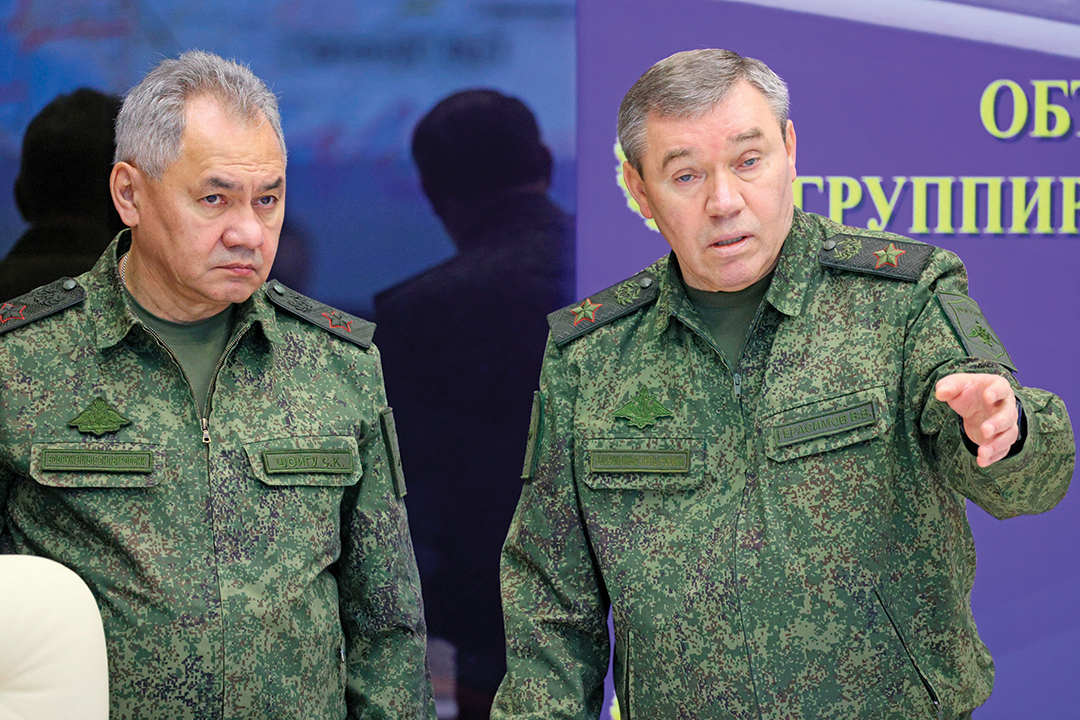
Conclusions
Collective leadership will temporarily return to Russia after Putin’s death or a power transition — managed by Putin (a process Russians would dub “operation successor”) — or through forced removal from office (a palace coup). Until then, Putin has no intention of standing aside, having disabled any functional mechanisms (and, of course, candidates) that would allow for a transfer of power. Personalistic regimes don’t do peaceful transfers. Forging intra-elite consensus around a post-Putin successor after military defeat is the very definition of “mission impossible.” If there is an unraveling of the Putinite system, current rubber stamp and moribund power structures may act with much greater autonomy, and seemingly irrelevant constitutional clauses will have a greater significance, as was the case in the late Gorbachev period.
At the same time, because personality matters, the more marginalized Putin becomes the more threatened he will feel and the more unpredictable his resultant behavior: Russian stability will be then traded by Putin for the illusion of his international strategic relevance and domestic political control. This was a choice Gorbachev eschewed in favor of jointly negotiating the construction of guardrails to prevent escalation and aggression in the international system. In response to the invasion of Ukraine by Russia, Ukraine and the West have united to constrict and constrain Russia today, as illustrated by the White House press conference with Ukrainian President Volodymyr Zelenskyy and U.S President Joe Biden on December 22, 2022.
In August 1991, U.S. President George H.W. Bush’s “Chicken Kiev” speech underscored the dangers of the sudden collapse of Soviet authority. As if recognizing such parallels, Putin’s televised address on December 21, 2022, reassured the Defense Ministry and army leadership that Soviet-style over-militarization would be avoided, even as Shoigu announced an increase in the size of the armed forces. Other consistent themes that parallel the experiences of 1989-1991 and 2022-2023 are becoming clearer. First, in both cases Russia did not and will not lie in ruins with a foreign army occupying Moscow. Second, any disintegrative dynamics were and will be the result of second-order, unintended effects. Third, Russia’s nearest neighbors continue to fear Russia’s strength more than its weakness and the consequences of a Russian victory more than Moscow’s defeat.
Paradoxically, although Putin strives to avoid Gorbachev’s legacy, his war of choice suffers multiple failures: an independent Ukrainian nation and, ultimately, state, grows stronger, the West becomes more cohesive and less fragmented, and the hoped-for external respect and admiration for Russian military prowess and power diminishes markedly. Succeeding only in failing, Putin will ultimately be judged to be a more tragic figure than Gorbachev. Putin’s reliance on unwarranted violence will prove to be his and his regime’s undoing, just as Gorbachev’s avoidance of the same was his making.


Comments are closed.